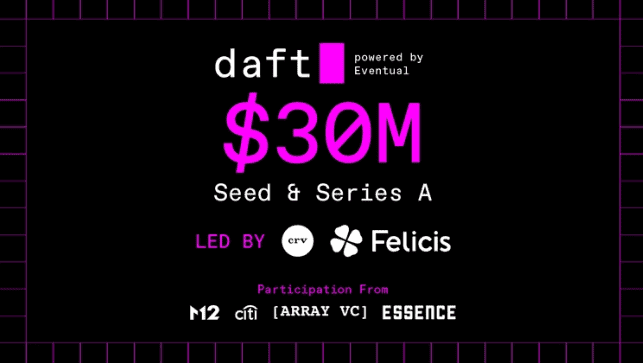Eventual Raises $30M to Revolutionize Multimodal Data Processing for AI Applications
2 Sources
2 Sources
[1]
How a data processing problem at Lyft became the basis for Eventual | TechCrunch
When Eventual founders Sammy Sidhu and Jay Chia were working as software engineers at Lyft's autonomous vehicle program, they witnessed a brewing data infrastructure problem -- and one that would only become larger with the rise of AI. Self-driving cars produce a ton of unstructured data from 3D scans and photos to text and audio. There wasn't a tool for Lyft engineers to that could understand and process all of those different types of data at the same time -- and all in one place. This left engineers to piece together open source tools in a lengthy process with reliability issues. "We had all these brilliant PhDs, brilliant folks across the industry, working on autonomous vehicles but they're spending like 80% of their time working on infrastructure rather than building their core application," Sidhu, who is Eventual's CEO, told TechCrunch in a recent interview. "And most of these problems that they were facing were around data infrastructure." Sidhu and Chia helped build an internal multimodal data processing tool for Lyft. When Sidhu set out to apply to other jobs, he found interviewers kept asking him about potentially building the same data solution for their companies, and the idea behind Eventual was born. Eventual built a Python-native open source data processing engine, known as Daft, that is designed to work quickly across different modals from text to audio and video, and more. Sidhu said the goal is to make Daft as transformational to unstructured data infrastructure as SQL was to tabular datasets in the past. The company was founded in early 2022, nearly a year before ChatGPT was released, and before many people were aware of this data infrastructure gap. They launched the first open source version of Daft in 2022 and are gearing up to launch an enterprise product in the third quarter. "The explosion of ChatGPT, what we saw is just a lot of other folks who are then building AI applications with different types of modalities," Sidhu said. "Then everyone started kind of like using things like images and documents and videos in their applications. And that's kind of where we saw, usage just increased dramatically." While the original idea behind building Daft stemmed from the autonomous vehicle space, there are numerous other industries that process multimodal data, including robotics, retail tech, and healthcare. The company now counts Amazon, CloudKitchens and Together AI, among others, as customers. Eventual recently raised two rounds of funding within eight months. The first was a $7.5 million seed round led by CRV. More recently, the company raised a $20 million Series A round led by Felicis with participation from Microsoft's M12 and Citi. This latest round will go toward bulking up Eventual's open source offering as well as creating a commercial product that will allow its customers to build AI applications off of this processed data. Astasia Myers, a general partner at Felicis, told TechCrunch that she found Eventual through a market mapping exercise that involved looking for data infrastructure that would be able to support the growing number of multimodal AI models. Myers said that Eventual stood out for being a first mover in the space -- which will likely get more crowded -- and based on the fact that the founders had dealt with this data processing problem firsthand. She added that Eventual is also solving a growing problem. The multimodal AI industry is predicted to grow at a 35% compound annual growth rate between 2023 and 2028, according to management consulting firm MarketsandMarkets. "Annual data generation is up 1,000x over the past 20 years and 90% of the world's data was generated in the past two years, and according to IDC, the vast majority of data is unstructured," Myers said. "Daft fits into this huge macro trend of generative AI being built around text, image, video, and voice. You need a multimodal-native data processing engine."
[2]
Eventual launches with $30M in funding to streamline multimodal data processing - SiliconANGLE
Eventual launches with $30M in funding to streamline multimodal data processing Multimodal data processing startup Eventual Inc. is looking to transform the way companies deal with unstructured data after closing on $30 million in venture capital funding. The startup said today it has closed on a $20 million Series A funding round led by Astasia Myers from Felicis, with strategic participation from M12 Ventures and Citi. It also announced a previously undisclosed $10 million seed funding round, led by Brittany Walker from CRV, Y Combinator, Essence VC and Array Ventures. Eventual sees itself eventually becoming the infrastructure foundation for multimodal data processing. It's the creator of an open-source processing engine that's purpose-built to deal with the "messiness" of unstructured information, capable of dealing with hundreds of petabytes of images, videos, audio files, handwritten notes and social media comments, among other data types. That processing engine is known as Daft, and it's already being used in production by companies such as Amazon Web Services Inc., Essential AI Labs Inc. and Together Computer Inc., where it helps them to process petabytes of information for workloads such as AI models, autonomous vehicles and product recommendation systems. Eventual founders Sammy Sidhu and Jay Chia hit upon the idea for Daft during their time working on autonomous cars at the ride-sharing company Lyft Inc., where they found themselves struggling to deal with mountains of multimodal data that couldn't be processed efficiently using legacy tools. In an interview with TechCrunch, Sidhu explained that self-driving cars need to process enormous volumes of messy data such as 3D scans, video feeds, images, text and audio. But when they were doing this at Lyft, they realized that no tool existed that was able to process and understand all of those different data types at the same time. As a result, Sidhu and Chia were forced to piece together various open-source tools to get to grips with it all. But this took time, and the systems they devised were extremely unreliable. "Traditional engines fail because modern AI workloads are different," Sidhu wrote in a blog post. "They run custom models, hit external APIs, and process wildly diverse data types. A 0.1% failure rate that's acceptable in testing becomes catastrophic when processing millions of files in production." Now, Sidhu says, there are many AI developers who are facing exactly the same kinds of challenges. Every company that's building AI applications needs to process enormous amounts of multimodal data, using tools designed for structured data such as web clicks and financial transactions. Sidhu and Chia's solution to this is Daft, which they helped to design while working together at Lyft. Daft is a Python-native open-source data processing engine that can work quickly across any kind of modality. When they set out to build it, the co-founders wanted to make Daft as impactful for unstructured data as the Structured Query Language was for tabular datasets. According to Sidhu, he never thought to start a company at first, but when he was applying for new jobs, he was asked by several interviewers if they could build a similar system for their companies. And that's what inspired him to instead create Eventual, which aims to commercialize the Daft platform. Alongside today's funding round, Eventual has opened the waitlist for access to the Eventual Cloud platform, which is said to be a production-grade version of Daft that's specifically designed for multimodal AI applications. Sidhu said Eventual has the ability to process petabytes of unstructured data as if it was merely processing megabytes of information, taking in millions of documents, images and videos without any infrastructure hiccups. It allows AI teams to ship new features in days rather than months, as they no longer have to spend 80% of their time worrying about data processing. With today's funding, Eventual is now setting out to expand its engineering team, eying talent with expertise in distributed systems, product engineers who want to help define how to work with data in the age of AI, and developer advocates who can show the world how to process multimodal data effectively.
Share
Share
Copy Link
Eventual, a startup founded by ex-Lyft engineers, secures $30M in funding to address the growing challenge of processing unstructured data for AI applications with its open-source engine, Daft.
The Genesis of Eventual
Eventual, a startup founded by former Lyft engineers Sammy Sidhu and Jay Chia, has emerged as a potential game-changer in the field of multimodal data processing for AI applications. The company's journey began when Sidhu and Chia encountered significant data infrastructure challenges while working on Lyft's autonomous vehicle program
1
.
Source: TechCrunch
The Challenge of Unstructured Data
The founders identified a critical gap in the AI industry: the lack of efficient tools to process diverse types of unstructured data simultaneously. Self-driving cars, for instance, generate massive amounts of data from 3D scans, photos, text, and audio. Traditional data processing methods were proving inadequate, forcing engineers to cobble together open-source tools in a time-consuming and unreliable process
1
.Introducing Daft: A Solution for Multimodal Data Processing
To address this challenge, Eventual developed Daft, a Python-native open-source data processing engine. Daft is designed to work efficiently across various data modalities, including text, audio, video, and more. The goal is to make Daft as transformational for unstructured data infrastructure as SQL was for tabular datasets
1
.Funding and Growth
Eventual has secured significant funding to fuel its growth:
- A $7.5 million seed round led by CRV
- A $20 million Series A round led by Felicis, with participation from Microsoft's M12 and Citi
1
The total funding of $30 million will be used to enhance Eventual's open-source offering and develop a commercial product for building AI applications based on processed data
2
.
Source: SiliconANGLE
Market Impact and Adoption
Eventual's timing couldn't be better, as the explosion of ChatGPT has led to increased demand for processing various data modalities in AI applications. The company has already attracted notable customers, including Amazon, CloudKitchens, and Together AI
1
.Related Stories
The Future of Multimodal Data Processing
The multimodal AI industry is predicted to grow at a 35% compound annual growth rate between 2023 and 2028, according to MarketsandMarkets. With 90% of the world's data generated in the past two years and the majority being unstructured, Eventual is well-positioned to address a critical need in the AI infrastructure landscape
1
.Eventual Cloud: The Next Step
Alongside its funding announcement, Eventual has opened a waitlist for access to the Eventual Cloud platform. This production-grade version of Daft is specifically designed for multimodal AI applications, promising to process petabytes of unstructured data with the ease of handling megabytes
2
.As Eventual continues to grow, it aims to expand its engineering team, focusing on distributed systems experts, product engineers, and developer advocates to showcase the power of efficient multimodal data processing in the AI era
2
.References
Summarized by
Navi
Related Stories
ApertureData Secures $8.25M Seed Funding for Innovative Multimodal AI Database
11 Oct 2024•Technology

LanceDB Secures $30 Million in Series A Funding for Multimodal AI Data Infrastructure
24 Jun 2025•Technology

E2B Raises $21M to Build Cloud Infrastructure for AI Agents, Attracting 88% of Fortune 100 Companies
29 Jul 2025•Technology

Recent Highlights
1
Elon Musk merges SpaceX with xAI, plans 1 million satellites to power orbital data centers
Business and Economy

2
French Police Raid X Office as Grok Investigation Expands to Include Holocaust Denial Claims
Policy and Regulation

3
UK launches formal probe into xAI as Grok continues generating sexualized images without consent
Policy and Regulation





